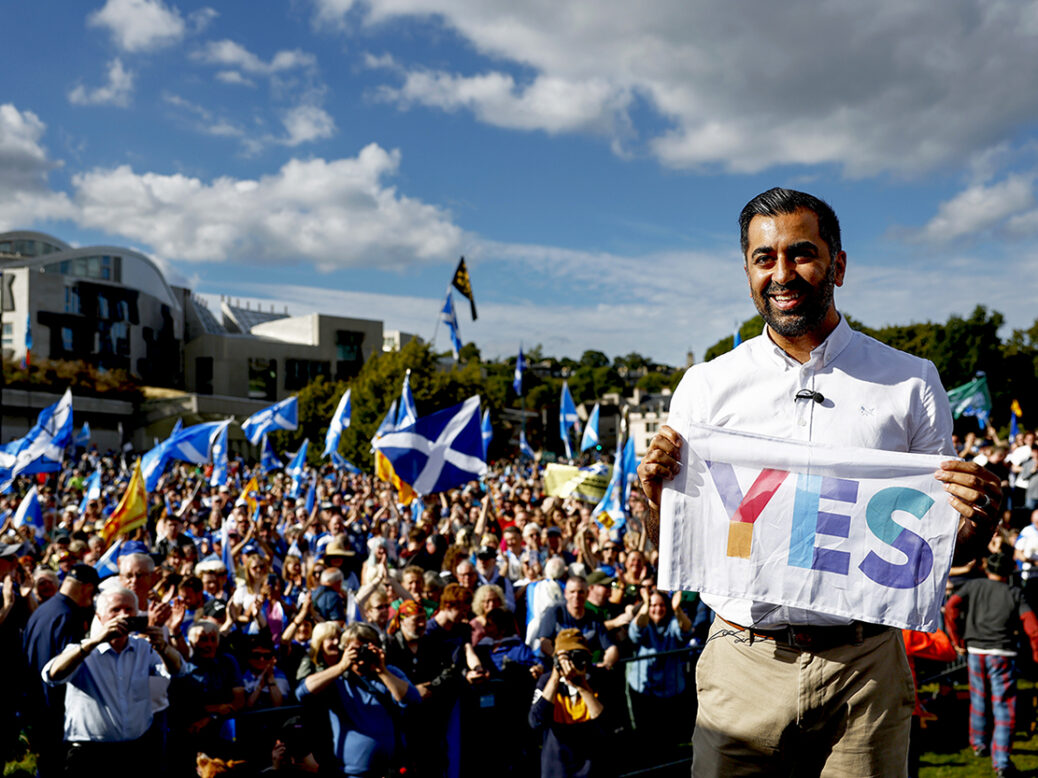
Let’s start with a prediction – always dangerous, but I feel on pretty safe ground with this one. If the SNP wins, say, 23 or 24 seats to Scottish Labour’s 21 or 20 in next year’s general election it will not start independence negotiations with Westminster.
This is not the position as currently set out by Humza Yousaf. According to a motion being put before October’s SNP conference by the First Minister, if his party returns the most Scottish seats the devolved administration will be “empowered to begin immediate negotiations with the UK government to give democratic effect to Scotland becoming an independent country”.
Consider the ostensible logic of this motion, which is also supported by the SNP’s Westminster leader Stephen Flynn. A party that could have lost around half of its seats, and that is in visible decline, intends to claim a mandate from voters to leave the United Kingdom.
I know this doesn’t fly. So do Yousaf and Flynn, and so do you. Which prime minister would agree to such terms? How can you negotiate around an empty table? On behalf of whom? The only people who are buying it are camped in George Square, Glasgow in full Highland regalia, waving a giant Saltire and glaring at anyone with an English accent.
When it comes to its founding purpose, the SNP is in a mess. The inability to secure a second referendum during its electoral height under Nicola Sturgeon led the former first minister down a political dead end. After being turned down by the Supreme Court, her final position, arrived at shortly before her resignation, was a desperate one: that the next election would be a “de facto” referendum, and that if the Nats won a majority of the votes cast then Scotland would be off.
That electoral outcome was always vanishingly unlikely anyway, but the policy was extreme enough to divide her party, while the impasse seemed to contribute to her decision to resign. What followed briefly threatened to be an outbreak of common sense – during the subsequent leadership election both main contenders, Yousaf and Kate Forbes, spoke of the need to build 50 per cent-plus support for independence on a sustained basis. If it was clear a majority of the population – somewhere between 55-60 per cent – was determined to secure a second referendum, it would happen. But not until then.
[See also: The Scottish state is broken]
Somehow, though, Yousaf has managed to go backwards, his new stance even more bizarre than Sturgeon’s was. Now the Nats need only be the largest Scottish parliamentary party, even if they end up considerably smaller than they are at present. Whatever momentum looks like, it’s not this.
The truth, I suspect, lies in a closer reading of the small print in the First Minister’s motion. However the latest push for freedom is being presented to a twitching SNP membership, Yousaf has left himself a fairly obvious way out.
The key phrase is “give democratic effect”, which, when you think about it, can mean a number of things. Yes, it could mean Yousaf and (probably) Keir Starmer agreeing who gets what of Scotland’s dwindling oil revenues and which soldiers will go where. But it also sounds very much to me like a woolly continuation of the demand for a referendum, which is of course the gold standard of giving “democratic effect”. It’s worth noting Yousaf is also proposing to publish “the detailed terms we would seek in discussions with the UK Government… and include draft legal text on the transfer of powers from Westminster to the Scottish Parliament necessary to prepare for independence”. There would be “a nationwide consultation on a draft interim constitution, which would be the founding document of an independent Scotland” and work on rejoining the EU. This is all prep, not delivery.
This isn’t just my take – it’s also the one I’m hearing from moderate voices in the SNP. As one senior source puts it, “Essentially the proposal from Humza and Stephen is about using the general election to secure leverage to negotiate a way to get a democratic expression of views. I’m seeing it not as ‘we get this and we negotiate independence’, but that ‘we get this then we negotiate a route to some form of referendum’, maybe tied to the 2026 election.”
Support for the SNP is falling in the polls, but backing for independence is not. It still sits at around 45 per cent, where it has hovered since the 2014 referendum. The smart move for the Nats would be to wait and see how a new Labour government performs, and if it meets the hopes of its Scottish voters. If Starmer falls short, support for independence could begin to tick up.
Yousaf said this week that he would be “quite keen” to look at amendments to his motion, which might suggest the leadership is looking to soften its position. If it doesn’t, it wouldn’t be unreasonable for voters to find themselves alarmed by what appears to be an astonishing piece of electoral overreach.
There is indeed no short cut. You don’t secure independence with 25 out of 59 Westminster seats and a declining performance at the next Holyrood election. The Scottish people will make it clear when or if they are ready. Yousaf is perfectly aware of this, and is only pretending otherwise for want of a better option.
[See also: Scottish independence is not going away]



